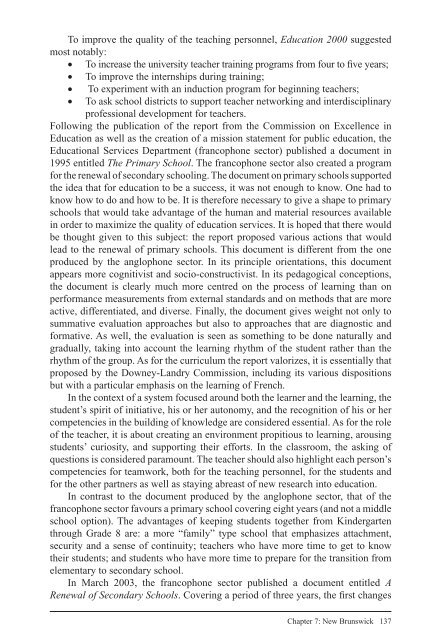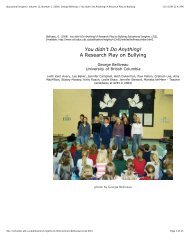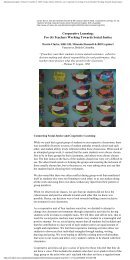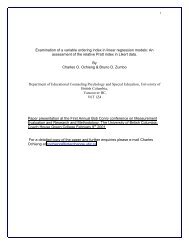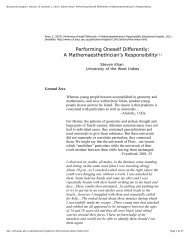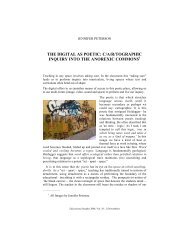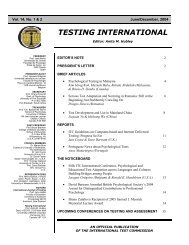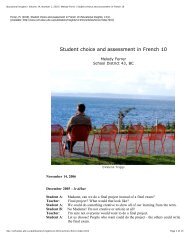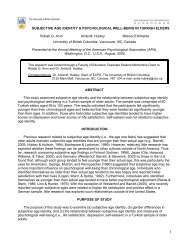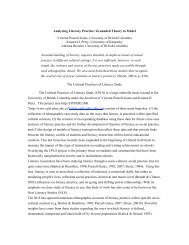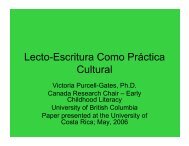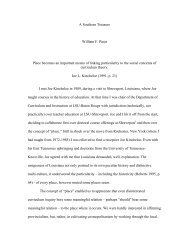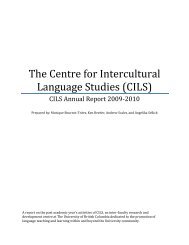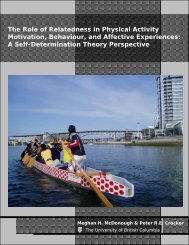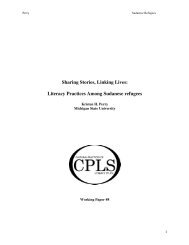The evolution of professionalism - Centre for Policy Studies in ...
The evolution of professionalism - Centre for Policy Studies in ...
The evolution of professionalism - Centre for Policy Studies in ...
You also want an ePaper? Increase the reach of your titles
YUMPU automatically turns print PDFs into web optimized ePapers that Google loves.
To improve the quality <strong>of</strong> the teach<strong>in</strong>g personnel, Education 2000 suggested<br />
most notably:<br />
• To <strong>in</strong>crease the university teacher tra<strong>in</strong><strong>in</strong>g programs from four to fi ve years;<br />
• To improve the <strong>in</strong>ternships dur<strong>in</strong>g tra<strong>in</strong><strong>in</strong>g;<br />
• To experiment with an <strong>in</strong>duction program <strong>for</strong> beg<strong>in</strong>n<strong>in</strong>g teachers;<br />
• To ask school districts to support teacher network<strong>in</strong>g and <strong>in</strong>terdiscipl<strong>in</strong>ary<br />
pr<strong>of</strong>essional development <strong>for</strong> teachers.<br />
Follow<strong>in</strong>g the publication <strong>of</strong> the report from the Commission on Excellence <strong>in</strong><br />
Education as well as the creation <strong>of</strong> a mission statement <strong>for</strong> public education, the<br />
Educational Services Department (francophone sector) published a document <strong>in</strong><br />
1995 entitled <strong>The</strong> Primary School. <strong>The</strong> francophone sector also created a program<br />
<strong>for</strong> the renewal <strong>of</strong> secondary school<strong>in</strong>g. <strong>The</strong> document on primary schools supported<br />
the idea that <strong>for</strong> education to be a success, it was not enough to know. One had to<br />
know how to do and how to be. It is there<strong>for</strong>e necessary to give a shape to primary<br />
schools that would take advantage <strong>of</strong> the human and material resources available<br />
<strong>in</strong> order to maximize the quality <strong>of</strong> education services. It is hoped that there would<br />
be thought given to this subject: the report proposed various actions that would<br />
lead to the renewal <strong>of</strong> primary schools. This document is different from the one<br />
produced by the anglophone sector. In its pr<strong>in</strong>ciple orientations, this document<br />
appears more cognitivist and socio-constructivist. In its pedagogical conceptions,<br />
the document is clearly much more centred on the process <strong>of</strong> learn<strong>in</strong>g than on<br />
per<strong>for</strong>mance measurements from external standards and on methods that are more<br />
active, differentiated, and diverse. F<strong>in</strong>ally, the document gives weight not only to<br />
summative evaluation approaches but also to approaches that are diagnostic and<br />
<strong>for</strong>mative. As well, the evaluation is seen as someth<strong>in</strong>g to be done naturally and<br />
gradually, tak<strong>in</strong>g <strong>in</strong>to account the learn<strong>in</strong>g rhythm <strong>of</strong> the student rather than the<br />
rhythm <strong>of</strong> the group. As <strong>for</strong> the curriculum the report valorizes, it is essentially that<br />
proposed by the Downey-Landry Commission, <strong>in</strong>clud<strong>in</strong>g its various dispositions<br />
but with a particular emphasis on the learn<strong>in</strong>g <strong>of</strong> French.<br />
In the context <strong>of</strong> a system focused around both the learner and the learn<strong>in</strong>g, the<br />
student’s spirit <strong>of</strong> <strong>in</strong>itiative, his or her autonomy, and the recognition <strong>of</strong> his or her<br />
competencies <strong>in</strong> the build<strong>in</strong>g <strong>of</strong> knowledge are considered essential. As <strong>for</strong> the role<br />
<strong>of</strong> the teacher, it is about creat<strong>in</strong>g an environment propitious to learn<strong>in</strong>g, arous<strong>in</strong>g<br />
students’ curiosity, and support<strong>in</strong>g their ef<strong>for</strong>ts. In the classroom, the ask<strong>in</strong>g <strong>of</strong><br />
questions is considered paramount. <strong>The</strong> teacher should also highlight each person’s<br />
competencies <strong>for</strong> teamwork, both <strong>for</strong> the teach<strong>in</strong>g personnel, <strong>for</strong> the students and<br />
<strong>for</strong> the other partners as well as stay<strong>in</strong>g abreast <strong>of</strong> new research <strong>in</strong>to education.<br />
In contrast to the document produced by the anglophone sector, that <strong>of</strong> the<br />
francophone sector favours a primary school cover<strong>in</strong>g eight years (and not a middle<br />
school option). <strong>The</strong> advantages <strong>of</strong> keep<strong>in</strong>g students together from K<strong>in</strong>dergarten<br />
through Grade 8 are: a more “family” type school that emphasizes attachment,<br />
security and a sense <strong>of</strong> cont<strong>in</strong>uity; teachers who have more time to get to know<br />
their students; and students who have more time to prepare <strong>for</strong> the transition from<br />
elementary to secondary school.<br />
In March 2003, the francophone sector published a document entitled A<br />
Renewal <strong>of</strong> Secondary Schools. Cover<strong>in</strong>g a period <strong>of</strong> three years, the fi rst changes<br />
Chapter 7: New Brunswick 137


